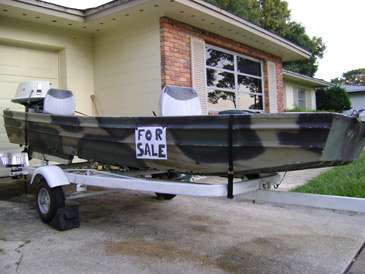
Contrary to what you may have heard, you don't need a $40,000 bass rig to compete. Chances are you'll find just what you need in the want ads.
As with buying anything used, there are potential snares to look for when searching for your new (to you) bassin' rig. Bob Decker, from Sonny's Marine Center in Orlando, Fla., breaks the process down to aluminum versus fiberglass and offers some valuable tips on what to look and what to stay away from in the second-hand boat market.
Know What You Need
You wouldn't buy a Cadillac on a Chevrolet budget, so why break the bank on a top-of-the-line bass rig? Decker says that the most important thing to remember when looking for a boat — new or used — is to know what you need. You probably don't need a 300-horsepower motor, three livewells and cruise control, but you do need an affordable vessel that doesn't use much gas, is reliable and fits your needs.
"You really need to know what you're going to use the boat for. If you fish a lot, don't get a bowrider. You'll want to know how much storage you're going to need, how much capacity you need, so when you are ready to look, you're less likely to be convinced otherwise by a salesman," he says.
Once you've established what you need, you can begin refining your search to hull composition, length and price range.
Aluminum or Fiberglass?
There are two materials that comprise the vast majority of small boats: aluminum and fiberglass. Aluminum boats are a very popular choice among the small water crowd and for good reason. They are lighter than fiberglass, are easier to fix and are more durable. Lighter means a smaller motor can be used more efficiently. That means you burn less gas. Welding is a whole lot easier than laying down mats of fiberglass to patch a hole, but make sure your aluminum is thick enough to be welded before putting it under the torch, otherwise you risk compounding your problem. In general, aluminum boats can withstand greater abuse than fiberglass. On the other hand, fiberglass will be more stable at high speeds and is generally preferred by experienced anglers.
"The people who are best served by an aluminum boat are first-time buyers, people who may have a hard time moving a boat off the trailer and people on a tighter budget," Decker says. "Its lighter weight also means you save on gas both in the motor and in your tow vehicle. It takes less power to move an aluminum boat."
Decker also mentions that aluminum boats require almost no maintenance or cleaning, but the weight trade-off equals a harsher ride, which is where fiberglass shines.
"Fiberglass requires more maintenance and cleaning, but is better for experienced fishermen who need lots of storage," Decker says. "Fiberglass boats are heavier, and are therefore preferred in rough water."
What to Look For
Buying a used boat is like buying a used car or a pair of shoes. You shouldn't buy until you've taken a test drive or tried them on.
"In marine centers or dealerships, the boats will be in the best possible shape, but buying from a private seller is a whole different scenario. You need to have them take you out and show you that everything works and how to use everything, because all boats are different," Decker says.
If you're looking at a fiberglass boat, Decker says to look for gouges and dents in the hull from rough or improper trailering and handling. Inspect the gel coat, ask where and how it was stored, inspect the interior condition and ask for service records.
Aluminum doesn't pose as many problems as fiberglass, but Decker says a potential problem is rust. If the previous owner took the boat in saltwater and it is carpeted, the carpet holds the salt in and could rust if not cleaned thoroughly and properly. Decker recommends welded hull over riveted, as welded aluminum is thicker and is less likely to leak. He notes that riveted is fine for a small johnboat, but strongly recommends welds for anything larger. Finding a boat that is in good shape is only half the equation, though.
The biggest expense in your new rig is the motor, so give it adequate attention. Decker says that a $75 diagnostic checkup at a marine service center could save you hundreds or thousands of dollars in the future. A big plus is finding a rig with a motor still under warranty.
Decker mentions that since most rigs come with trailers, it is important to ask if it has ever been launched in salt water. If the trailer is not galvanized steel or aluminum, you're going to have problems.
"A steel trailer that has been put in salt water is going to start falling apart no matter how much you clean it. You can paint it all you want, but it will start to deteriorate," he says.
Buying a used boat can be fun, simple, and save you lots of money. Just be aware of the pitfalls, create and stick to a budget and, most importantly, know what you need.




